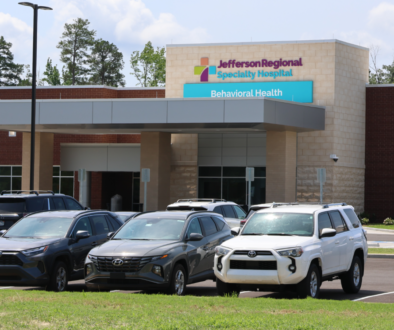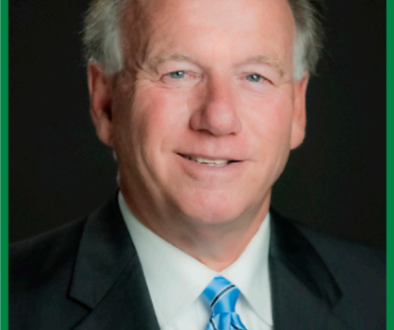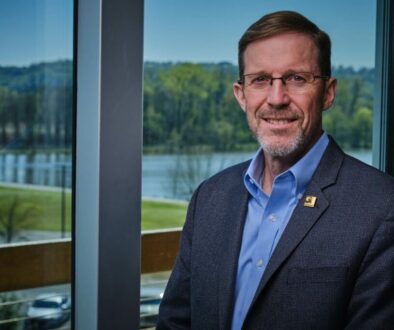Working Together Pays Dividends for Arkansas Road Community
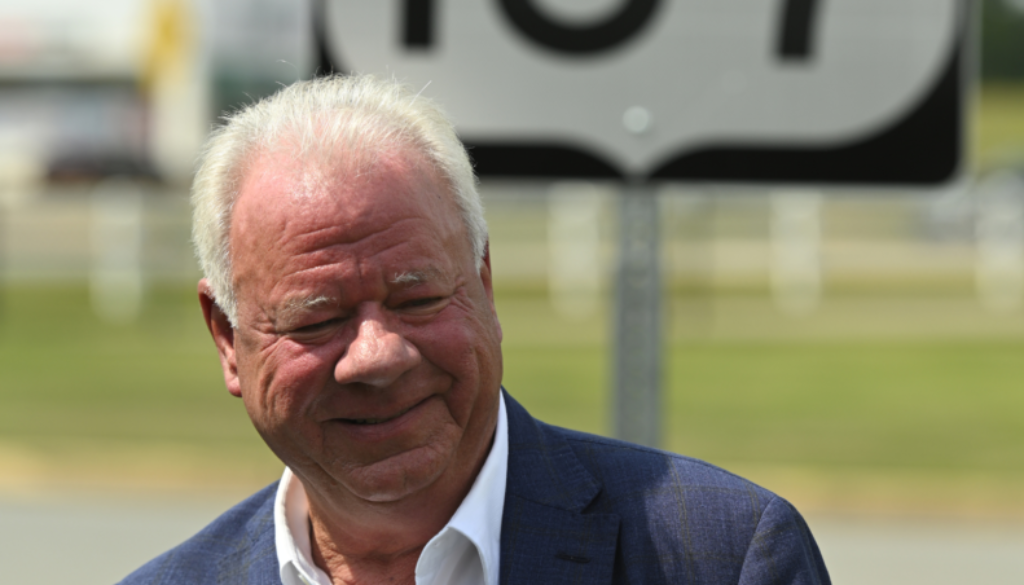
Unified Voices in an Angry World
By Joe Quinn, AGRF Executive Director
On a September Tuesday afternoon in El Dorado, it still feels like summer as dozens of state and community leaders who have impacted infrastructure growth in Arkansas for decades gather to celebrate Madison Murphy. Murphy is a legendary business leader who in 2012 co-chaired a statewide bond issue election that passed a temporary ½ cent sales tax for road development.
Murphy is also a former member of the Arkansas Highway Commission who deflects the praise coming his way with humor. He seems a little amused that Highway 167 will now be known as the Madison Murphy Highway. Murphy’s work on the Move Arkansas Forward bond issue campaign in 2012 permanently changed infrastructure funding in Arkansas. In his remarks, Murphy sums up his efforts simply: “I love the state of Arkansas and I love Southern Arkansas.”
Former highway commissioner Jonathan Barnett tells the crowd, “Madison has been a gift to the state of Arkansas. He volunteered to help when he didn’t have to.” Infrastructure development like this leads to private sector jobs and safer roads across all our communities.
Mark Lamberth is the President and CEO of Batesville-based Atlas Asphalt. Mark’s son Lance will be the next leader of an Arkansas-based and family-owned company that has been building a better Arkansas for three generations. Mark co-chaired the bond issue campaign with Murphy in 2012. He remembers the campaign fondly: “Diverse industries and businesses from all around the state worked together to pass the half cent sales tax.”
Lamberth jokes that his primary role in the campaign was to chauffer Murphy around the state and keep him on time, but it’s clear on this day that the campaign was a sophisticated effort with leaders like Lamberth and Murphy putting together a real coalition to pass the bond issue in the face of loud opposition.
Barnett says, “The half cent sales tax had a lot of opposition in 2012, but it transformed the way we are still building highways and roads today.”
This gathering is a reminder that in an angry and confrontational political world, the organizations and people who move in the Arkansas infrastructure world have stayed civil and respectful. House Speaker Matthew Shepherd grew up here and still lives here. He understands that working together pays dividends for communities and regions, “Highway 167 is a lifeline for this region that connects people and places. Every single day, this road is a part of someone’s journey.”
“The different regions of Arkansas generally understand each other, and local leaders tend to work cooperatively. As a smaller state, I think there is a feeling that we are all in this together. Maybe it was the pandemic or shifts in the economy, but there is a sense of purpose and working for the greater good – the state highway system.”
— Arkansas Highway Commissioner, Marie Holder
On this day, the speaker, the legendary business leader, three current or present ARDOT Directors, and three decades of highway commissioners celebrate an industry that creates jobs and makes it easier for a parent to take a child to daycare or the dentist. The road and bridge world is a throwback to a time when gathering multiple stakeholder organizations with a unified message generally led to success.
Culture of Cooperation
ARDOT Director Lorie Tudor worked at ARDOT as a young woman, then left to get an engineering degree. She came back and quietly worked her way to the top spot in the sprawling department. The nostalgic feel of this day is not lost on her when she says, “We are here today in part because we are celebrating 70 years of the Mack-Blackwell amendment being in place. That amendment has always allowed us to make progress and bring continuity to the work we do.”
The Mack-Blackwell amendment was passed by voters in the 1950s to give the Arkansas Highway Commission autonomy to make decisions about road construction projects without political interference.
Arkansas Highway Commissioner Marie Holder understands the need for community and strategic alignment in this sector of the economy, “The different regions of Arkansas generally understand each other, and local leaders tend to work cooperatively. As a smaller state, I think there is a feeling that we are all in this together. Maybe it was the pandemic or shifts in the economy, but there is a sense of purpose and working for the greater good – the state highway system.”
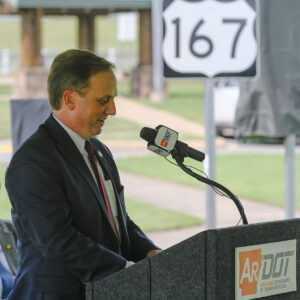
When Speaker Shepherd is asked how many people approach him with suggestions about roads, Shepherd grins and says, “Well, not as many as I used to get. I think Arkansans understand that we have addressed road funding in the short term. Our roads are, for the most part, superior to roads in states around us.”
Shepherd is probably hearing less complaining because Arkansas is in the process of receiving and allocating $3.8 billion dollars in federal infrastructure money passed by Congress. The annual conversation about what road funding the general assembly will approve in the next legislative session has mostly been replaced with a dialogue on how to best allocate the available resources.
Current Arkansas Highway Commission Chairman Alec Farmer reminds the crowd that despite what some people think, highway funding does inherently follow traffic, “Right now 50% of our roads carry 90% of the traffic.”
In 2020, as the pandemic shut down many aspects of life in Arkansas, voters were asked to go to the polls and make permanent the half cent sales tax that Madison Murphy fought for in 2012. Despite political and logistical obstacles created by Covid, Arkansas Good Roads executive board member Robert Moery managed a successful campaign to make the ½ cent tax permanent. If voters had said no, the average city or county road department in the state would have seen budget reductions of 30%.
Moery thinks it was an example of the infrastructure community coming together when it mattered the most, “Everyone in Arkansas is impacted by quality roads, and we need to continue to invest in infrastructure. ARDOT, and the Issue 1 Coalition we put together, were specific in telling voters why the funding extension was needed, and what exactly the money would be spent on. It was a reminder that transparency and precisely defining needs is a successful strategy.”
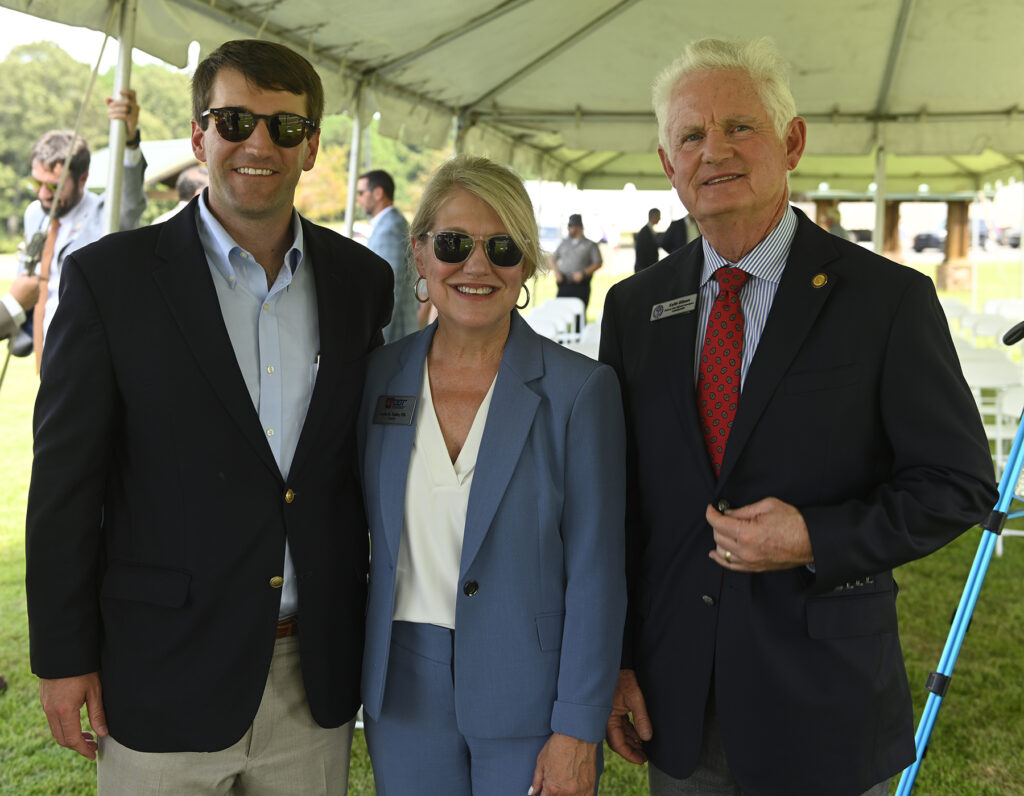
Local Leaders Unified in a New Way
Mark Hayes is the Arkansas Municipal League Executive Director. Hayes says the mayors and community leaders he represents feel they have more of a voice in infrastructure issues than they once did. Hayes says that the Municipal League and the Association of Arkansas Counties embraced the reality that a mayor and county judge working together have far more power than if they work separately. Hayes says, “The general state of the relationships between cities and counties is much stronger than it used to be. Working together to tackle large projects means more can be done rather than working separately.”
“The general state of the relationships between cities and counties is much stronger than it used to be. Working together to tackle large projects means more can be done rather than working separately.”
—Mark Hayes, Arkansas Municipal League Executive Director
Hayes says federal policies and regulations don’t always make it easier for any local leader to get any project done, but he points out that at the state level the relationship local leaders have with ARDOT has never been better. “Our relationship with Lorie Tudor is great right now,” he says. “Lorie has been very easy to work with, and she really listens when we bring an issue to her.”
Any Arkansas Good Roads member from any sector of the economy has specific budget or policy issues that they are most interested in. That is the simple reality of different businesses responding in different ways to labor shortages, inflation, and shifting political realities. But as the end of another year creeps into sight, we are again seeing that infrastructure leaders in Arkansas continue to embrace the idea that on the days when it really matters, working together inevitably pays more dividends than working separately.
